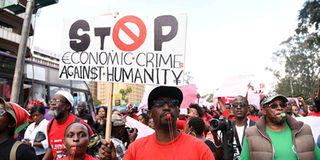Shame of elites dipping fingers into public coffers

Kenyans take part in a protest against corruption in Nairobi on May 31, 2018. PHOTO | FILE | NATION MEDIA GROUP
What you need to know:
- In general, to EAT is to benefit illegally, criminally and unjustly, often concerning some communal property.
- To “amass” property normally entails direct robbery of other human beings, especially of the public.
In what passes as proper communication in the public services of Kenya, Malawi, Tanzania, Uganda, Zambia, Zimbabwe and other former colonies of Western Europe, the ordained way to “EAT” is to collude in dipping long fingers into the public’s safes.
It includes the practice of taking bribes in order to perform one or another illegal “service” to an individual or group.
To EAT, then – through the mouths of East Africa’s users of English, including religious ones – is the taproot of the problem.
It is to benefit inhumanly, including theft from one’s employer, in what the English language normally calls corruption.
In the minds of East Africa’s consumers of newspapers and other public media, somebody had “EATEN” something very substantial in the run-up to one set of Kenya’s recent parliamentary and local government elections.
EXPOSE THE ROT
The Nation’s sub-editors were so sure of it that, in their page-one “splash” headline on Friday, November 30, they posed the following telltale question to the linguistically long-suffering readers of Kenya’s English-language newspapers: “Who ATE what? Election chiefs expose the rot”.
In the East African version of the language of the Queen of England, to “EAT” is to benefit criminally, often copiously, from an organisation, especially the government. For instance, to EAT is to habitually take a bribe. In general, to EAT is to benefit illegally, criminally and unjustly, often concerning some communal property.
The criminal method of the individual or group benefitting has been the story of Kenya’s public service (and even that of private companies), especially since 1963, when Kenyans fell into the illusion that they had ceased to be subjects of exploitation.
Western Europe was the country whose elite had taught the budding elites of soon-to-be-independent African and other Third World countries on how to dip long fingers into the public’s increasingly shallow coffers.
CIVILISATION
If, then, the Third World’s educated classes, specially Africa’s, are, as a matter of fact, terribly corrupt, we owe it completely to those who introduced us to a few things alleged to be “education” , “morality,” “civilisation” and correct economic property organisation. We owe it to European ideas which are alleged to add up to something called “civilisation”. It is like advocating the jungle life between lions and hares.
If dirty activities are rampant throughout East Africa, even the most superficial investigation will reveal that what our teachers, including religious ones, allege to be education, is the source of it. It is that the other person – because he or she is armed with the same philosophy of civilisation (namely, grabbing) – is our enemy number one.
What Europe has forced us to assume as education is the tap-root of all of our horribly inhuman injustices to one another.
In East Africa and other former European colonies, greed and corruption are the province – the badge – of the “educated elite”.
MISUSE OF LANGUAGE
That, quite clearly, is a terrible misuse of language. How can a properly educated human being behave like a hyena against another human being and then go on to say he is “civilised”?
Practically all members of the educated classes throughout East Africa are hungrier for quick property and more prone to material crimes than are the larvae of butterflies.
The classrooms both of Europeans and ours teach us directly that a person’s “success” is to be measured by the amount of material possessions that the person has “stashed away”. To “amass” property normally entails direct robbery of other human beings, especially of the public.
It ordinarily means violent robbery and theft by our socio-economic peers.





